Scientists are one step closer to stopping drug-resistant tumors from growing

Scientists have solved a long-standing mystery surrounding a cancer-promoting protein and how it causes tumor growth. The findings are an important step in the quest to make cancer drugs more effective since aggressive tumors often become adept at resisting drugs and other therapeutic agents.
The recent discovery by a team of scientists including Benjamin Myers, Ph.D., an investigator at Huntsman Cancer Institute at the University of Utah (the U) and assistant professor of oncological sciences at the U, is published today in the journal Nature Structural and Molecular Biology, and builds upon his previous research into drug resistance. "Our findings suggest some new strategies that we might be able to use in the clinic to be able to improve patient outcomes," says Myers.
The research team studied a protein called Smoothened that plays vital roles in healthy tissue and organ development. However, when Smoothened becomes overactive, it can trigger the formation and spread of brain and skin tumors. Blocking Smoothened can stop cancer from spreading, but eventually tumors adapt, making this approach ineffective. Medulloblastoma is the most common pediatric brain tumor in the U.S., and basal cell carcinoma is the most common cancer in the U.S. with about 3.6 million cases every year.
Smoothened is part of a signaling pathway in the body. A signaling pathway is like a telephone wire that runs from the cell surface to the interior of the cell. The messages that travel along that wire provide instructions to the cell.
"We knew the 'telephone wire' existed but we had no idea how it worked. That has left a big gap in our ability to turn it off therapeutically to treat cancer," Myers says. "The hope is that by better understanding it, cancer drugs will become far more effective."
These findings explain how Smoothened gets switched on at a molecular level and what the transmitted signal is.
Myers says the undergraduate biology students who worked in his lab were pivotal to this discovery. He'd also like to acknowledge key trainees John Happ, Corvin Arveseth, and Isaac Nelson, as well as the postdoctoral students essential in his research. Key collaborators include Susan Taylor, Ph.D., University of California, San Diego, Friedrich Herberg, Ph.D., University of Kassel, Germany, and Gianluigi Veglia, Ph.D., University of Minnesota.
More information: John T. Happ et al, A PKA inhibitor motif within SMOOTHENED controls Hedgehog signal transduction, Nature Structural & Molecular Biology (2022). DOI: 10.1038/s41594-022-00838-z
















